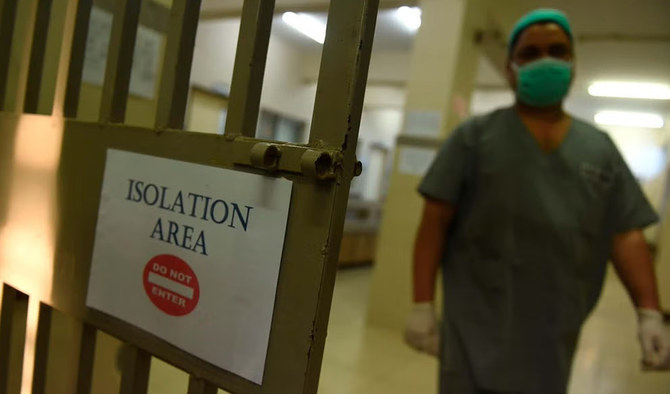KARACHI: At least three Karachi residents have died from Naegleria fowleri, a brain-eating amoeba, in the first two weeks of July, a spokesperson of the health department in Pakistan’s southern Sindh province said on Saturday, adding two of these deaths occurred this week.
Naegleria fowleri is found in freshwater sources like lakes, ponds, rivers, hot springs and poorly managed swimming pools and pipes connected to tap water. The micro-organism enters the human body through the nose and causes a sudden infection of the brain called naegleriasis.
In most cases, the infection is fatal.
It’s a relatively new problem in Pakistan. The first case of Naegleria fowleri infection was reported in Karachi in 2008. Since then, over a hundred people have died from the infection, with all three Karachi cases this year occurring in July.
“The latest deaths have occurred on Thursday,” said Ali Nawaz Channa, spokesperson for Sindh health department, while speaking to Arab News. “A 35-year-old died in Aga Khan Hospital while a 22-year-old garment factory worker died in Jinnah Hospital.”
The family of the latter was quoted in a health department report as saying that he visited a nearby swimming pool with friends last Sunday. Subsequently, he developed a fever on Monday and was admitted to the hospital on Wednesday. His condition deteriorated on Thursday and was put on ventilator support but could not survive.
The other patient was admitted to Aga Khan Hospital and died after “ten days of battle with high grade fever,” the official report added. The family suspects the infection was contracted from performing ablution at a nearby mosque.
Prior to them, another patient, a resident of Qur’angi area of the city, died last Friday, according to the health department.
A 2021 Sindh health department study conducted in 50 Union Councils of Karachi found that 95 percent of the water samples were completely unfit for human consumption, which experts believe is one of the major reasons behind the spread of the brain-eating amoeba.
Primary amebic meningoencephalitis, the brain infection caused by the amoeba, has common symptoms including extreme headache, changes in taste, high fever, sensitivity to light, nausea and vomiting.
Symptoms occur within 24 hours of infection, but since they resemble meningitis, the infection is rarely diagnosed early enough through a blood test.
Medical experts warn late treatment is not always effective.
Provincial health department of Sindh reports three deaths caused by brain-eating amoeba in Karachi
https://arab.news/gdyqb
Provincial health department of Sindh reports three deaths caused by brain-eating amoeba in Karachi

- Naegleria fowleri is an emerging problem in Pakistan, where the first case was reported in 2008
- Health department says all three deaths in Karachi took place during the ongoing month of July
Pakistan urges world to treat water insecurity as global risk, flags India treaty suspension

- Pakistan says it is strengthening water management but national action alone is insufficient
- India unilaterally suspended Indus Waters Treaty last year, leading to irregular river flows
ISLAMABAD: Pakistan on Tuesday urged the international community to recognize water insecurity as a “systemic global risk,” warning that disruptions in shared river basins threaten food security, livelihoods and regional stability, as it criticized India’s handling of transboundary water flows.
The call comes amid heightened tensions after India’s unilateral decision last year to hold the 1960 Indus Waters Treaty “in abeyance,” a move Islamabad says has undermined predictability in river flows and compounded climate-driven vulnerabilities downstream.
“Across regions, water insecurity has become a systemic risk, affecting food production, energy systems, public health, livelihoods and human security,” Pakistan’s Acting Permanent Representative to the United Nations, Ambassador Usman Jadoon, told a UN policy roundtable on global water stress.
“For Pakistan, this is a lived reality,” he said, describing the country as a climate-vulnerable, lower-riparian state facing floods, droughts, accelerated glacier melt, groundwater depletion and rapid population growth, all of which are placing strain on already stressed water systems.
Jadoon said Pakistan was strengthening water resilience through integrated planning, flood protection, irrigation rehabilitation, groundwater replenishment and ecosystem restoration, including initiatives such as Living Indus and Recharge Pakistan, but warned that domestic measures alone were insufficient.
He noted the Indus River Basin sustains one of the world’s largest contiguous irrigation systems, provides more than 80 percent of Pakistan’s agricultural water needs and supports the livelihoods of over 240 million people.
The Pakistani diplomat said the Indus Waters Treaty had for decades provided a framework for equitable water management, but India’s decision to suspend its operation, followed by unannounced flow disruptions and the withholding of hydrological data, had created an unprecedented challenge for Pakistan’s water security.
Pakistan has said the treaty remains legally binding and does not permit unilateral suspension or modification.
The issue has gained urgency as Pakistan continues to recover from last year’s monsoon floods, which killed more than 1,000 people and devastated farmland in Punjab, the country’s eastern breadbasket, in what officials described as severe riverine flooding.
Last month, Deputy Prime Minister Ishaq Dar said Pakistan had observed abrupt variations in river flows from India, creating uncertainty for farmers in Punjab during critical periods of the agricultural cycle.
“As we move toward the 2026 UN Water Conference, Pakistan believes the process must acknowledge water insecurity as a systemic global risk, place cooperation and respect for international water law at the center of shared water governance, and ensure that commitments translate into real protection for vulnerable downstream communities,” Jadoon said.










